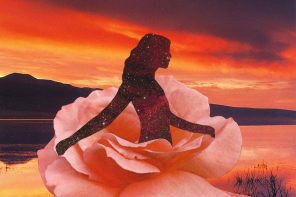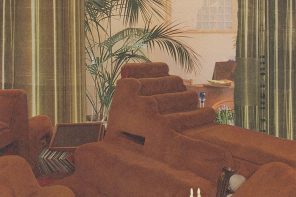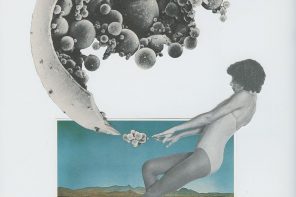I don’t swim in the ocean because my mother always told me about the piss and shit that buoys along the surface. She’d point to all the white girls in bikinis wiping the sea foam from their lips: Look, spit building up in the corners of their mouths, mucus and sweat mixing together. All bodies were shameful, but she saw the way I looked at girls and made sure to emphasize that our bodies were the filthiest.
Before all the white girls I knew decided that Blackness was a skin they’d like to slip into for a while, I became practiced in croaking pink girl tongue. Wore down the sharp edges of words by rolling them over in my mouth like peach pits. In ugly words: a boy kicks my chair and calls me a slave, I’m being too sensitive about all the Black bodies piling up, I’m actually quite well spoken, but could I write this from a white perspective? In prettier words: I let them poke and pull and call me out my name because my real one tripped against their teeth. I nodded when I was told I don’t sound the way I should. Yes, I planned it this way.
I’m an expert at watching from afar—in admiration and disgust. I can whittle the most beautiful thing into filth. Even when I look at myself, it is like I am observing my body through a microscope. I am shining and beautiful and glaring and rotten. Turning an apple between my fingertips brings a fluttering anticipation in my chest. Biting into it feels like I’ve been dead for twenty years and this is my kiss back into life. But if I see one mushy pit or a blackening core, no amount of eating around the tainted spots can keep my stomach from turning. When my secret girlfriend and I held hands, my brain drowned out all the things they said about films and art and instead focused on how my sweat pooled into our palms. As if it were only mine. Imagining their flesh melting in my grasp—leaving open wounds for all decaying things to gather.
At ten, my mother used my own little Acer laptop to show me pictures of Black people hanging from trees. White folks down below, smiling and sliding rope in their palms. Emmet Till’s beat-in face. Red exposed from Black flesh like split-open plums. She forced me to sit and look and understand that I was not going to be treated the same as my white classmates. By then she knew what she had: a daughter shaped by white hands like a brown clay doll, raised to fold, bend—to be beaten soft for later. A daughter who thought she could move and breathe as easily as her white friends. There will never be enough breath.
There is no water in Lawton, Oklahoma. The bleached white sky rolls out over dead grass, and the red dirt is hard like bone. When I would visit in the summer, I would tuck my chin above the counter to watch my grandma press the weight of her large body on the kitchen knife to crack open cantaloupe and watermelon and share half with me. For the longest time I thought I just didn’t have a father. No man was ever involved in my conception. I had emerged from my mother’s head fully formed and dressed in her favorite clothes: twirling in clacking hair beads and clicking my heels in my bucked Mary Janes, and I pitied my classmates who needed the dead weight of a father in their homes.
I was raised by women. A collection of mothers and aunties all practiced in scarred knuckles and sharp voices that eddied the drink in a man’s cup. My marker drawings on the fridge. A dusty hallway Bible with my great-grandmother folded in its pages. My auntie guiding my fingers across the columns of a dictionary to search for new words to describe the perception our bodies lived in as Black women—almost destined to be brutalized. Promiscuous. Anomaly. Volatile. There was camaraderie in the reality that if our bodies were brutalized, no one was going to care. And if any man had his way, no one would even know.
Most of the women who raised me found out themselves. When I didn’t think that any of the photos of shirtless boys an older girl swiped through on her phone were cute. When I caught myself staring at girls around my apartment complex. When I would excitedly describe a woman’s beauty in detail. Her hair is so swishy. Her smile is pretty. I like the shape of her eyes.
The rebuffs were gentle, at first. Boys can be pretty, too. Some boys are nice. Can’t you just pretend? I couldn’t, so I was cut loose. A punch down. Something to be feared. Something to bruise.
The books I read at school all ended with some gesture of love: kisses and clutched hands, promises for forever. The stories my aunties told all ended with shoulder shrugs and it’ll probably be different for you. Which is why I’m left trying to build a new love from children’s books, sweaty palms, seeping plums. From foreign films, calloused hands, and bread just past its sell-by date. From salt water and ponytails that curl up instead of swishing down. And this stilted sweet tongue I have—which the girl on the phone says is so soft.
My grandma once took me to swimming lessons at the YMCA. I liked the sharp smell of chlorine. My mom told me it was bleach, so this water would keep me clean. I kept knocking into the pool rope, string of bobbing fruit, which separated the children from the old people whose wrinkled bodies slipped laps down the lane. The white instructor brought us to the deep end and told us to jump. I refused at first, crying on the edge while everyone stared up at me from the water. All I could think about was my feet not hitting the ground—fluttering uselessly while I gasped for air. So when I finally jumped, I made sure to do so near the rope, so when my body began to sink, I could grab onto it, and breathe again.
Demree McGhee currently studies literature and writing at UC San Diego. Her poetry and prose is either featured or forthcoming in Palette Poetry, Lucky Jefferson, Lunch Ticket, Wax Nine Journal, Burn All Books, and more. You can read more of her work at demreemcghee.com.




